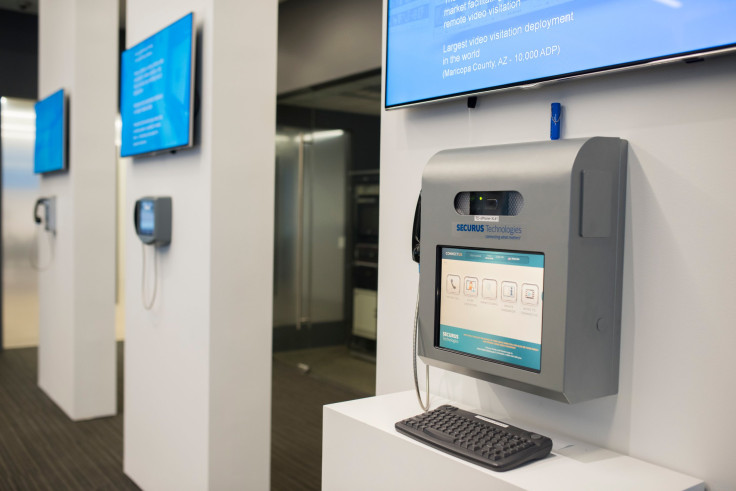Amid Death Threats, An Embattled Prison Phone Company CEO Speaks Out

DALLAS — Rick Smith, the chief executive of Securus Technologies, doesn't talk to reporters. But death threats have a way of persuading you that it's time to tell your side of the story.
One woman, Smith told International Business Times, called in a bomb threat to one of his company's facilities in Denver. "She threatened to blow up my call center and kill me," Smith said. If Smith were "trapped in a burning building, I'd throw gasoline on the fire," one commenter posted on social media. Another wrote: "Some of these CEOs need to be beaten by former convicts."
For the past eight years, Smith has been the CEO of Securus, a billion-dollar company that provides prison and jail pay phones to some 1.2 million inmates locked up around the country. It's a controversial business because the people who pay the bills are the wives, children, parents and friends of those incarcerated. And for many years, these people — along with a small army of inmate advocates — have accused the prison phone industry of exploiting a literal captive audience by price-gouging families with exorbitant phone rates, while padding corporate coffers and enriching investors.
In some states, a 15-minute call to a jail can cost up to $15, according to Peter Wagner, the executive director of the Prison Policy Initiative. Wagner says that ever since the private prison phone industry sprouted in the early 1990s, monopoly contracts — and profit-sharing agreements with local sheriffs — have driven up phone prices to absurd levels, bringing financial calamity to communities that are already just scraping by. "You tell average people about what goes on this industry, and they get that angry," says Wagner. "Securus and their peers are routinely hated."
In response to over a decade of pressure by activists and defense lawyers, in October 2015 the Federal Communications Commission voted to rein in the "excessive rates and egregious fees" charged by companies to "some of society's most vulnerable" people. The ruling, which becomes effective March 17, also discourages, but does not ban, revenue-sharing agreements with jails and prisons. In filings with the federal government, Securus described the new rules as a potential "business-ending" event, and has vowed to appeal.
Indeed, the new rules have conjured the prospect of something akin to an industry death threat — the risk that investors may exit the business. The idea is sufficiently worrisome that Smith has found himself engaging in an unfamiliar and unexpected activity: answering questions from the press about himself and the nature of his enterprise.
Up until now, Securus has remained largely out of the view of the general public. But the federal regulations portray Smith's company (as well as his industry) in a harsh light. Activists have long claimed businesses like Securus are profiteers who serve no useful function, that their near-monopoly contracts allow them to set their own rates without scrutiny, and that they operate with no transparency.
Hoping to recast his company — and himself — Smith has made himself accessible to IBT, going on the record for the first time.
"It's Better Than Being A Doctor"
In an interview at Securus' technology center in Dallas last month, Smith, 65, defended his company's reputation. A tall man with two American flags pinned to the company ID on a lanyard around his neck, he presented the company's work as a community service. Inmates often use the phones for nefarious activities, he said, and Securus provides vital investigative and public safety tools for law enforcement to prevent crime. "I like [this business] because we save thousands of people's lives every year," he said. It's "better than being a doctor."
As for high prices, Smith said his 1,160-person firm does not earn excessive profits; he pointed the finger at correctional facilities and local sheriffs who, he says, drive up rates by demanding hefty commissions on the call revenue. "It's tremendously unfair," he says. But "it's the nature of being in the business."
It works like this: Rates are driven up because prison phone firms like Securus take a cut of their call revenues — in some cases up to 90 percent — and hand the money to law enforcement departments. Companies like Securus and Global Tel*Link term these payments "commissions." They're completely legal. But prisoner rights advocates deride them as kickbacks that raise prices for inmates and families. Over the last 10 years, Securus has given $1.3 billion to local law enforcement departments, according to company figures.
FCC Commissioner Mignon Clyburn, the Obama-appointed regulator and daughter of South Carolina Democratic Congressman Jim Clyburn, has described the prison phone industry as "the most egregious case of market failure I have seen in my 17 years as a state and federal regulator." In an interview with IBT in November 2015, Clyburn said she was motivated to reform the industry, in part, because she herself had been forced to pay high phone prices to connect with a friend behind bars. "We are attempting to right a market dysfunction that is obvious," she said.
Commissioner Clyburn's quest is what prompted Smith to become more visible and outspoken. When announcing the regulations, she claimed some rates were as a high as $14 per minute. Smith says this startling figure (the apparent cause of the death threats) was meant to push an agenda: that it's not an accurate number and certainly not the norm.
"Our average rate is 21 cents per minute," he says. "That's what it is, that's what it has been the last six months. You can't be telling people we charge $14 per minute."

The actual figures are difficult to ascertain, says Lee Petro, a telecommunications attorney who has worked pro bono on the behalf of inmates and their families for the last six years to push through the FCC reforms. "[Securus] won't tell the FCC what they charge," he says. "That's completely unverifiable. We have what they say their costs are, but we don't know what their average charge is, because they absolutely refuse to provide that information to the FCC. We've consistently asked for copies of contracts, printouts of what they pay in commissions, the rates that are being charged at facilities.They have steadfastly refused."
Securus has in fact not provided the FCC (or IBT) with detailed billing information on its millions of customers, but the company has provided the FCC with the average rates it has charged, as well as more granular information on its costs. The company submitted its "cost study" to the FCC in 2014, though it remains under public seal. "We have provided a tremendous amount of data to the FCC," Smith said.
"It Isn't Always Like 'Shawshank Redemption'"
Now he wants to let the public in on his operations, as well.
Prisoner rights advocates misunderstand the business, he says. To keep communities safer, Securus has poured much of its capital into high-tech investigative services like real-time monitoring and call databases, Smith says. Securus representatives routinely work with law enforcement personnel to follow up on illicit activities and threats made over the phone systems. "It isn't always like "Shawshank Redemption" stuff where someone didn't really do something wrong," he says.

The company has helped police solve thousands of crimes, from robberies to rapes to murders, Smith said. But pressed for details, he can't provide them. "You'll have to rely on us, and leave it as 'the company alleges,'" he says. "Because I can't help you… We don't get a report from the facility saying, 'Your system prevented five suicides today, your system prevented 12 outside hits today.' It's just kind of what you understand from being in the business for years, and talking to enough sheriffs, deputies, wardens and understanding what goes on behind bars."
Smith joined Securus after rising through the ranks in the telecommunications business with stints at companies in Rochester, New York, and Minneapolis. In 2008, he received a call from Securus' then-owner, HIG Capital, to interview for the position of chief executive. (An HIG representative did not return phone calls.)
Since 2012, the company has made 17 acquisitions totaling $596.75 million. All of this investment, Smith says, limits Securus' profits. (At an FCC hearing last year, Smith said the company does not earn "excessive profits." He repeated this statement three times to federal regulators.)
Securus is majority-owned by Abry Partners, a Boston-based private equity group that took a majority stake in the company in 2013, and continued to invest in Securus twice more since then, according to Smith.
On its website, Abry describes itself as "one of the most experienced and successful media, communications, business and information services focused private equity investment firms in North America." Since its founding, Abry says it has "has completed over $42.0 billion of leveraged transactions."
The new regulations put Securus in a precarious spot with its investment bankers: The company currently appears to be reliably profitable and making acquisitions. But if government moves affect the company's profit, it could make the business less attractive to Abry. Smith says Abry remains a committed partner. An Abry representative, Azra Kanji, did not respond to a request to reply to Smith's comments.
Because the company is privately held, Securus is not required to disclose specifics around its yearly earnings. However, according to investor slides leaked earlier this year, and published by the Prison Policy Initiative, Securus was presenting investors with about $115 million in profits in 2014.
While Securus told IBT that its gross revenue is $531 million, Smith declined to comment on specifics about the company's phone business profitability. He acknowledged, however, that the investor slides were accurate, but the profits from the company's core phone business were "roughly half to two-thirds of the numbers that are on that page" in 2014, which would represent profits of about $60 to $75 million. "Those numbers include inmate telephone services and all of our other deregulated services that we offer," he says.
Those profit margins don't seem particularly outrageous to Jeff Kagan, an independent telecommunication analyst for the last 30 years. But Kagan says the prison phone industry needs reform because families end up dealing with high rates. "If this was a service that was provided by an AT&T or Verizon, the costs would not be where they are now," says Kagan. "The companies don't have competition, they don't have to be cost-competitive. A percentage is paid to the jail or to the government, and that jacks the price up. It's a broken system."
'Phone Calls Were The Least Of My Concerns'
In the current system, private companies aren't the only ones making money — county sheriffs and jail officials receive funds as well.
Securus provided IBT with customer testimonials from sheriffs in several states around the country who have used a company database of call recordings in the course of their investigations. One missive, written by a sheriff in North Carolina in 2012, thanked Securus for helping "solve crimes that otherwise may have gone unsolved." (That sheriff has since retired and was unavailable for comment.) Other law enforcement officials praise the company for helping retrieve call recordings for prosecutors, and helping put criminals behind bars, though none of the officials cited a specific number of cases.

Chris Miller, a state prosecutor in Florida who has listened in on hundreds of Securus' inmate calls (and whose office does not receive a commission), says he and his colleagues regularly use the recordings in the course of his investigations. The calls are typically used only after a person is arrested and not yet convicted, while investigators are still looking for more evidence.
Though inmates are alerted that calls are recorded, Miller says they'll often admit to crimes or threaten witnesses not to testify. "It's very common to look at jail calls for potential evidence," he says, noting one recent case in which a suspected stalker called his victim to threaten her.
However, prison wardens in state correctional facilities where commission payments do not exist — and where local officials do not earn revenue from Securus or any other company — are notably less inclined to tout any particular company's investigative or safety capabilities. "I was a warden for 10 years, and phone calls were the least of my concerns," says Daniel Vasquez, a 36-year veteran of California's correctional system.
Investigators do occasionally monitor call recordings, Vasquez says, but in his experience, phone operators rarely provide more than a simple call recording to investigators. "The [company's] bottom line is profit," he says. "They're running a phone line company to make money."
Born into a blue-collar section of Buffalo, New York, Smith says he's sensitive to the fact that many inmates and their families struggle to make ends meet. "You're dealing with friends and family members who are on a fixed budget, where things like gas prices mean a huge amount to them," he says.
These days, Smith lives on a far different budget. He can afford his passion for bow hunting and in 2012 completed the "Grand Slam" of North American sheep, a hunting expedition that can cost upwards of $100,000. ("I'm the 27th person in history to ever do that," he says.) But he also remembers that his family never owned their own home, and that they lived on welfare checks when his father, who dropped out of high school to work at a Chevrolet factory, got injured at work.
To be sure, there is no federal law that requires jails or prisons to offer phone services to inmates in the first place; phone calls are considered a privilege that can be revoked. The National Sheriffs Association has threatened to remove the phone systems altogether if the government eliminates commissions. Sheriffs say the inmate call money is used for "inmate welfare funds" and to cover added security costs of monitoring calls.
If the FCC is forcing Smith to lower his company's rates, then he thinks it's only fair to lower or end commission payments, he says. "People look to me and they look to Global Tel*Link, and they beat us all up and say we're charging too much," he says. "Yeah, well, half of the rate is commissions… I'm just the punching bag for people because I don't directly point to my [correctional] facility customers and say, 'Talk to them.'"
But advocates say the problem of commissions is only part of a larger systemic issue: monopoly contracts. Paul Wright, executive director of the Human Rights Defense Center, says companies should be required to compete on lowest price to customers — not how much they can offer back to jailers or sheriffs.
"The critical thing about Rick Smith and Company is that the thing they dread most is a concept of a free market where consumers have choice, because they could never survive in one," says Wright.
Smith shrugs off Wright's criticism as "stuff you can put in quotes and it sounds really good." He added, "Most of the stuff I say is plain old telecom management."
But the two men, surprisingly, agree on one point: Perhaps the government should foot the phone bill.
"If this is a core law enforcement investigative function, why should prisoners and their families have to pay for it?" Wright says. "Why doesn't the government pay for it?"
"If a state said, ''We're going to do it for free from now on, we're just going to increase property tax,' I'm fine with it," Smith says. "I will still win. I will still make my rate of return. I will collect it from the government. It's an apolitical kind of thing."
He added, however, "I'm not in favor of people like inmate advocates saying 'I think it should be for free, and Securus ought to do this stuff for free.' Because I'm running a business."
© Copyright IBTimes 2025. All rights reserved.





















